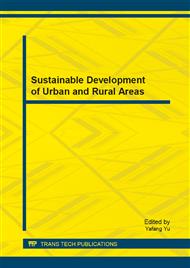p.15
p.19
p.31
p.36
p.40
p.47
p.53
p.60
p.65
Study of Architectural Space Efficacy Based on the Modern Theory of Validity
Abstract:
At present, more emphasis has been laid on the efficacy study of architectural space. As people conduct various activities in the architectural spaces, they would have varied perception and experiences, which is also of great importance in a teaching session. When teachers guide the students to carry out design process, attention should also be paid to this indispensable aspect. Under the guidance of the modern theory of validity, teachers should adopt all types of experiences in the architectural space as the factors for analysis, allowing students to carry out efficacy evaluation of architectural space from multiple perspectives, and seek method for evaluating the special efficacy to get the best evaluation methods and architectural space design criteria, so as to promote students' awareness and understanding of architectural space to design architectures suited to the need of the people.
Info:
Periodical:
Pages:
40-46
DOI:
Citation:
Online since:
January 2014
Price:
Сopyright:
© 2014 Trans Tech Publications Ltd. All Rights Reserved
Share:
Citation:


